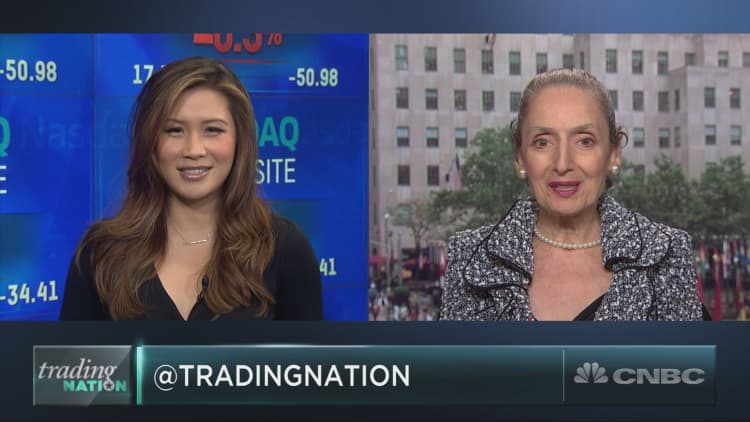
It's been more than a year since the major U.S. indexes made new highs, but as investors continue to look for answers in this muddled market, one veteran technician explained that history dating back to the Truman administration indicates the equity market may remain placid for a long time to come.
"This environment is a tricky juncture," Louise Yamada said Friday on CNBC's "Trading Nation," referring to the Wall Street angst surrounding the potential for a summer rate hike. And it's that very potential for a second hike that has Yamada examining the charts from 60 years ago.
Given the current economic backdrop, the founder of Louise Yamada Technical Research Advisors laid out her case for why the Dow and the S&P could remain range-bound between the peak in May 2015 and the low from February 2016 for years to come. She pointed to 1946, when interest rates were raised for the first time following a bull market in bonds that began after the 1932 lows. Thereafter, there was a major drop in the equity markets before a limited range set in that lasted into 1949.
"A month after the first rate hike in 1946, the market went down 23 percent," said Yamada. "Then, it moved into this horizontal trading range for three years with 15 percent up and down."
Similarly, U.S. markets saw a rise from November to December of 2015, then Yellen made the first rate hike and the S&P 500 sank more than 11 percent to its February low of 2016. Since the climb back in March, markets have remained steady.
"If we follow that 1946 scenario, we may end up simply in this trading range where we don't have a trending market, but we have more or less of a benefit for those who can trade quickly," noted Yamada in relation to the quick reversals the market has recently seen in defensive stocks, like utilities.
"That trading range could continue for a period of time. We think that would be the healthiest result," said Yamada when considering the prospects for breaking to new highs or entering a bear market. "We've seen bear markets on small and mid-cap stocks. Maybe this trading range environment will allow a period of repair for the damaged stocks and a period of consolidation for those stocks that are excessively up." To note, Yamada recently lowered her firm's probability for an extension of the bear market.
When discussing the market's negative response to when the Fed raised interest rates last December, Yamada expressed concern over what could happen following a hike in 2016, especially if it comes this summer.
"We will have to watch and see whether the support levels are broken or whether the market can sustain this trading range," warned Yamada. "In these deflationary periods, it's very hard for the Fed to raise rates. It will be a long period before the market is capable of absorbing rising interest rates again."
Want to be a part of the Trading Nation? If you'd like to call into our live Wednesday show, email your name, number, and a question to TradingNation@cnbc.com






